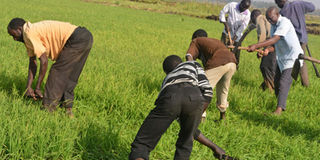We won’t leave wetlands, Kibuku farmers dare government

Obedience. Concerned residents destroy a rice garden in Limoto Wetland after a directive from Nema in 2017. A section of residents and local leaders in Kibuku District have opposed the government decision to evict them from wetlands. PHOTO BY PAUL TAJUBA
A section of residents and local leaders in Kibuku District have opposed the government decision of evicting them from Limoto Wetlands.
The farmers said they are left with no option but to sue the government if officials from the Ministry of Water and Environment evict them without compensation.
The government started the operation to evict wetland encroachers in the districts of Kibuku, Budaka and Pallisa last month.
The operation, which was conducted by the Ministry of Water and Environment in partnership with Environment Protection Police Unit (EPPU), left the farmers crying foul after their gardens of rice, maize, sorghum, sweet potatoes in the Mpologoma River belt, were slashed in a bid to restore the wetland.
Officials said they had given the farmers ample time to vacate but they had defied the directives.
Farmers speak
However, during the dialogue between the community and the Members of Parliament sitting on the Parliamentary Forum on climate change, the farmers said they will not vacate unless they are compensated.
“The government before throwing us out of the wetland should first compensate us so that we find an alternative source to feed our children or else we are going to sue it,” Mr John Mukisa, a resident of Kitantalo Village, Tirinyi Sub-county, said.
Earlier last year, the ministry had issued a six-month ultimatum to farmers. The ultimatum elapsed in July, last year.
Mr Augustine Maleka, the councillor representing Bulangira Town Council in Kibuku, said the decision to forcibly evict farmers was illegal.
“Majority of locals depend entirely on these wetlands for household incomes, so evicting them without a solution is not only dangerous but also illegal,” he said, adding that wetlands cover 75 per cent of Kibuku District.
Ms Sylvia Katooko, a councillor, said farmers need to be compensated, warning that if they [farmers] are not fully compensated they will have no option but to drag government to court for barbaric eviction.
“The government shouldn’t rush to evict farmers but must put in place other alternative means such as irrigation, fish ponds before they could enforce the evictions,” Ms Katooko said.
The degraded wetlands include Mpologoma, Namatala and Limoto, all in the eastern region.
The Kibuku natural resource officer, Mr David Okurut, however, said evictions are intended to address the worrying trend of massive encroachment on the wetlands.
“The level of degradation by these farmers despite warning is justifiable enough to act and forcibly evict them to save our nature,” he said.
The senior environment officer of Kibuku District, Mr James Gwokaka, said the government would establish irrigation schemes to support farmers in commercial business.
Mr Lawrence Esonga, the chairperson of Parliamentary Forum on climate change, said the committee was collecting views from people so that it could be included in the proposed laws towards the protection of wetlands.
He said Uganda is faced with the challenge of climate change that has resulted in serious disasters.
“We are not making laws to evict people but purposely to regulate wetland management use. This could only be done when these activities are streamlined to protect the sustainable use of wetlands,” he said.
The State minister for Local Government, Ms Jenipher Namuyangu, said most of the available wetlands and natural forests in the district have been degraded as a result of high population.
“We are engaging farmers such that they can use the wetlands in the sustainable manner to mitigate effects of climate change,” she said.
Wetlands
The degraded wetlands include Mpologoma, Namatala and Limoto, all in the eastern region.
Wetlands are among the most important natural resources in Uganda because they mitigate climate change.
The Government of Uganda is, therefore, very concerned about the rapid degradation and loss of the wetlands particularly in the areas around urban centres and in the rural areas of Busoga, Tororo, Kigezi, Bukedi and some areas of Ankole.



